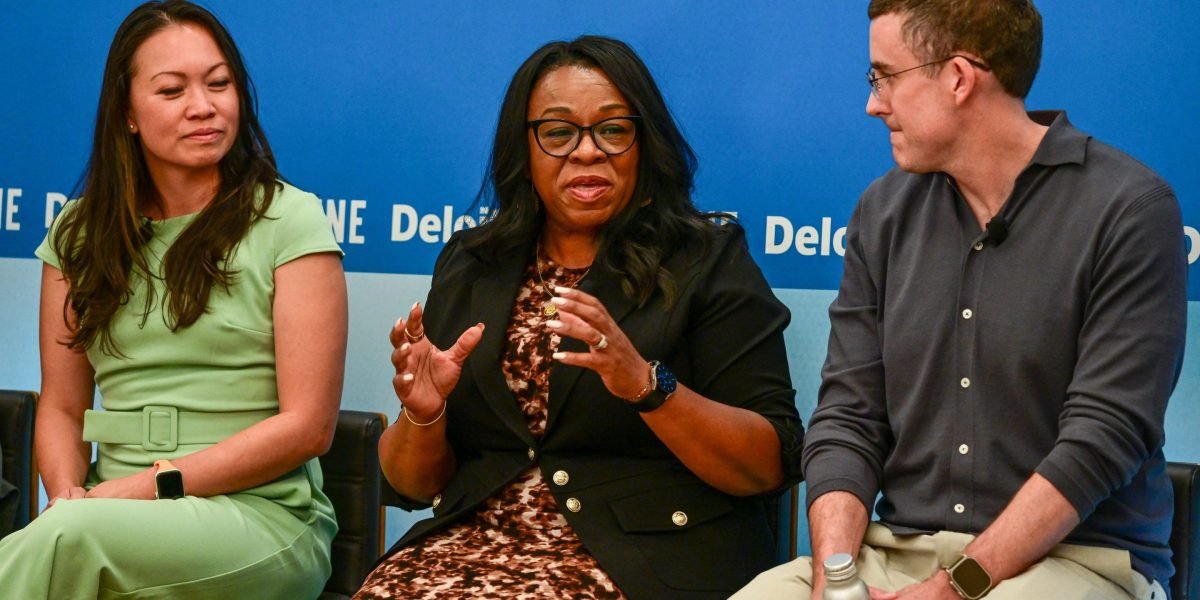Business
Sam Altman on AI’s Role in Potential Financial Fraud Attacks

Sam Altman is urging financial leaders to learn to outwit the very technology he helped create.
Speaking before a group of financial regulators and industry leaders on Tuesday, the CEO of ChatGPT maker OpenAI said financial companies need to do a better job of staying one step ahead of artificial intelligence — or risk losing customers’ money.
“A thing that terrifies me,” he said, “is apparently there are still some financial institutions that will accept a voice print as authentication for you to move a lot of money or do something else.”
“That is a crazy thing to still be doing,” Altman said, saying, “AI has fully defeated most of the ways that people authenticate currently — other than passwords.”
Altman, speaking at an event hosted by the Federal Reserve in Washington, DC, warned against what he called a “significant impending fraud crisis” as a result of AI.
“Society has to deal with this problem more generally, but people are going to have to change the way they interact. They’re going to have to change the way they verify,” he said, adding, “This is a huge deal.”
During the Q&A session, Altman was asked what keeps him up at night, and one of his responses involved a large-scale financial attack.
In that scenario, he predicted someone, perhaps an adversary of the United States, gets a hold of powerful AI to attack the US using bioweapons or to “break into financial systems and take everyone’s money.”
Protecting against that would be tough because the adversary’s AI would be smarter than ours and therefore hard to defeat, he said.
Altman is not alone in his fears. Earlier this year, Accenture surveyed 600 bank cybersecurity leaders, and 80% said they believe generative AI is empowering hackers faster than their banks can respond.
Business
Robinhood CEO Says AI Won’t Fully Take Over Trading

AI isn’t ready to take over all the human aspects of trading, said Robinhood’s CEO.
In an interview with Bloomberg Wealth released on Wednesday, Vlad Tenev reiterated his view that people don’t always trade to make money and that there will always be a human aspect to business.
“Most of the time you’re not doing it just because you want to make money,” he said. “You also love trading and you’re you’re extremely passionate about it.”
He added: “I don’t think there’s going to be a future where AI just does all of your thinking, all of your financial planning, all the strategizing for you.”
Tenev, who cofounded the brokerage platform in 2013, said that AI could be a bigger platform shift than mobile and cloud technologies. He said that while every company will quickly become an AI company, AI won’t completely take over trading.
“It’ll be a helpful assistant to a trader and also to your broader financial life,” he said. “But I think the humans will ultimately be calling the shots.”
Tenev made similar remarks about how investors “legitimately enjoy trading” in an August interview with Axios.
On Tuesday, Robinhood announced it was building a social media platform where users can post their trades and track what other investors, including politicians, are buying or selling.
Other CEOs are also wary of pronouncing AI the future of trading.
Ken Griffin, the founder and CEO of Citadel, said he doesn’t think AI will revolutionize the investment business.
“Do we use it in our investment business? A little bit, a little bit. I can’t say it’s been game-changing,” Griffin said in a May interview with Stanford Graduate School of Business.
“It saves some time. It’s a productivity enhancement tool. It’s nice, I don’t think it’s going to revolutionize most of what we do in finance,” Griffin added.
On the topic of AI and trading, Goldman Sachs CEO David Solomon has said that AI has been a big boost to productivity in the investing business.
In an interview with CNBC last year, he said that 40 years ago, when he started the banking business, it took six hours to compare two stocks. Now, it takes an instant, he said.
The firm has already launched ventures that could change how Wall Street makes deals. Louisa AI, a startup founded within the firm six years ago, helps bankers and investors analyze millions of articles and employees’ knowledge to identify deals.
Business
AI Breakthrough Promises More Consistent Results—A Win for Small Businesses – Times Square Chronicles

AI Breakthrough Promises More Consistent Results—A Win for Small Businesses Times Square Chronicles
Source link
Business
Aha moments, the ‘first ten hours’, and other pro tips from business leaders building AI-ready workforces

As businesses face pressure to bring new AI tools on board, they have the dual challenge of effectively incorporating the technology into their operations and of helping their workforce make the best use of the technology.
Longstanding methods for assessing the skills and performance of an employee, as well as hiring practices, are being upended and re-imagined, according to business leaders who spoke at the Fortune Brainstorm Tech conference on Tuesday in Park City, Utah.
Technical skills, contrary to what you might think, are not paramount in the age of AI. In fact, for many employers, technical skills are becoming less important.
“For the first time this summer on our platform we saw a shift,” said Hayden Brown, CEO of Upwork, an online jobs marketplace for freelancers. In the past, when Upwork asked employers on its platform about the most important skills they were hiring for, the answer invariably involved deep expertise in certain technical areas, Brown said. “For the first time this summer, it’s now soft skills. It’s human skills; it’s things like problem solving, judgement, creativity, taste.”
Jim Rowan, the head of AI at consulting firm Deloitte, which sponsored the Brainstorm discussion, said an employee’s “fluency” should not be an end goal in itself. More important is intellectual curiosity around new tools and technology.
And that’s something that needs to start at the top.
“We’ve done a lot of work with executive teams to make sure the top levels of the organization and the boards are actually familiar with AI,” said Rowan. “That helps because then they can communicate better with their teams and see what they’re doing.”
For Toni Vanwinkle, VP of Digital Employee Experience at Adobe, it’s critical for employees at all levels of an organization to have an “aha moment” with AI technology. And the best way to bring that about is for each employee to get their “first ten hours” in.
“Go play with it,” Vanwinkle says. “Sort your email box, take the notes in your meeting, create a marketing campaign, whatever it is that you do.” Through that initial process of personal exploration, you start to understand the potential of the technology, she says.
The next step, Vanwinkle says, is collaboration, discussions, and experimentation among colleagues within the same departments or functionalities.
“This whole spirit of experiment, learn fast. That twitch muscle can turn into something of value when people talk openly,” Vanwinkle says.
The importance of embracing experimentation, and fostering it as a value within the organization, was echoed by Indeed chief information officer Anthony Moisant.
“I think about the pilots we run, most of them fail. And I’m not embarrassed at all to say that,” Moisant says. It all comes down to what a particular organization is optimizing for, and in the case of Indeed, Moisant says, “what we go for is fast twitch muscle. Can we move faster?”
By encouraging more low stakes experiments with AI, companies can gain valuable insights and experience that employees can leverage quickly when it counts. “The only way to move faster is to take a few bets early on, without real long term strategic ROI,” says Moisant.
Workday Vice President of AI Kathy Pham emphasizes that with new tools like AI, getting a full picture of an employee’s value and performance may take a bit longer than some people are used to. “Part of the measurement is better understanding what the return is and over what period of time,” she said.
-

 Business2 weeks ago
Business2 weeks agoThe Guardian view on Trump and the Fed: independence is no substitute for accountability | Editorial
-
Tools & Platforms4 weeks ago
Building Trust in Military AI Starts with Opening the Black Box – War on the Rocks
-

 Ethics & Policy2 months ago
Ethics & Policy2 months agoSDAIA Supports Saudi Arabia’s Leadership in Shaping Global AI Ethics, Policy, and Research – وكالة الأنباء السعودية
-

 Events & Conferences4 months ago
Events & Conferences4 months agoJourney to 1000 models: Scaling Instagram’s recommendation system
-

 Jobs & Careers2 months ago
Jobs & Careers2 months agoMumbai-based Perplexity Alternative Has 60k+ Users Without Funding
-

 Education2 months ago
Education2 months agoMacron says UK and France have duty to tackle illegal migration ‘with humanity, solidarity and firmness’ – UK politics live | Politics
-

 Education2 months ago
Education2 months agoVEX Robotics launches AI-powered classroom robotics system
-

 Podcasts & Talks2 months ago
Podcasts & Talks2 months agoHappy 4th of July! 🎆 Made with Veo 3 in Gemini
-

 Funding & Business2 months ago
Funding & Business2 months agoKayak and Expedia race to build AI travel agents that turn social posts into itineraries
-

 Podcasts & Talks2 months ago
Podcasts & Talks2 months agoOpenAI 🤝 @teamganassi


